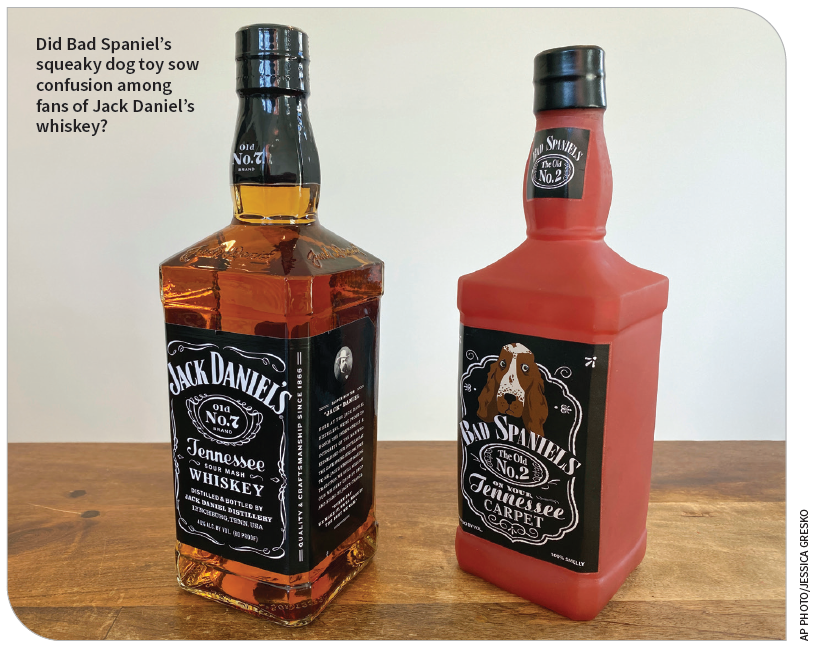Trademarks: Two Landmark Decisions From 2023 Will Continue to Raise Questions in 2024 and Beyond
Publication | 01.10.24
A 2023 U.S. Supreme Court decision limiting the reach of U.S. trademark law outside of the country could lead to further litigation by trademark holders looking to push back on those boundaries, says Crowell & Moring partner Preetha Chakrabarti, a member of the firm’s Technology & Intellectual Property Department and the Advertising & Brand Protection Group.
In Abitron v. Hetronic, the high court vacated $96 million of a $115 million jury award for an American manufacturer that had sued former distributors who sold knockoff versions of its industrial radio remote controls—using its distinctive yellow-and-black design—primarily in foreign countries.
The overall decision was a unanimous one, with all justices agreeing that Congress did not intend the U.S. trademark statute—the Lanham Act— to apply extraterritorially. That’s consistent with the court’s recent holdings that, in general, statutes should only apply domestically, absent explicit instruction by Congress that they should apply overseas.
However, the justices split on exactly how to determine whether trademark infringement occurred domestically or overseas. The majority opinion held that the U.S. statute applies to a trademark’s unauthorized “use in commerce” in the U.S.
A concurrence, signed by three justices, said the Lanham Act should apply whenever “there is a likelihood of consumer confusion in the U.S.”

Finally, Justice Ketanji Brown Jackson issued her own opinion, agreeing with the majority but raising the issue of how to determine where the “use in commerce” occurred, which can be complicated in today’s global marketplace, where a single good could be manufactured, sold, purchased, used, and resold, all in different countries.
When the Supreme Court first agreed in late 2022 to take up Abitron v. Hetronic, there was hope that its decision would finally clear up the issue of how U.S. trademark law applies in an international context, says Chakrabarti. At the time, federal appeals courts were deeply split, with at least three different tests being applied to determine extraterritorial application among the circuits.
“In some ways, though, the Supreme Court’s decision leaves some important, unresolved questions,” Chakrabarti says. “I think we’re going to see more litigation over the phrase ‘use in commerce’ going forward.”
Trademark holders with global footprints can still seek protection under foreign trademark laws. But registering, maintaining, and enforcing a trademark around the world can be burdensome and expensive, especially for small and medium-size companies. Additionally, damages under the Lanham Act are generally much more favorable to trademark holders than those available under foreign laws, says Chakrabarti.
So while Abitron v. Hetronic certainly reins in application of the Lanham Act overseas, it’s likely that trademark holders will try to argue for an expansive interpretation of what it means to “use [a mark] in commerce” in the United States.
For example, they could assert that a defendant that manufactured a counterfeit product overseas should be liable under the Lanham Act even though they did not sell the product in the U.S., but a third party did. Whether the manufacturer knew or should have known the third party was going to sell the product in the U.S. might—or might not—be a relevant factor.
With the right case and the right set of facts, a brand may very well decide to test the metes and bounds of the Supreme Court’s decision.
— Preetha Chakrabarti
Who’s laughing now?
Big-name brands may get the last laugh against those who seek to profit off making fun of them, following a recent U.S. Supreme Court ruling on the parody exception in trademark law.

In a unanimous decision, the Court sided with Jack Daniel’s Properties against VIP Properties, which sold a “Bad Spaniel” squeaky rubber dog toy that looked strikingly similar to a bottle of Jack Daniel’s whiskey, but with a bit of bathroom humor added.
For example, while the Jack Daniel’s label indicates that it is “40% ALC. BY VOL.,” Bad Spaniel is “43% POO BY VOL.” Where Jack Daniel’s says it is “Old No. 7 Tennessee Sour Mash Whiskey,” Bad Spaniel is “The Old No. 2 on Your Tennessee Carpet.”
The Ninth Circuit Court of Appeals found that VIP did not infringe or dilute Jack Daniel’s trademarks because, as a parody, it was protected by the First Amendment. The Supreme Court disagreed, saying the court should have looked at whether there was “likelihood of confusion” among consumers that the dog toy was a Jack Daniel’s product, says Chakrabarti.
While at one time it might have been unthinkable for an alcoholic beverage brand to put its name on a dog toy, that may no longer be the case, as brand collaborations of all kinds have become extremely common. For example, Jack Daniel’s currently has its name on a limited-edition Indian motorcycle and a pair of Shoe Surgeon high-top sneakers.
The Jack Daniel’s case is somewhat similar to a 2007 case brought by luxury goods maker Louis Vuitton against a company that was (and still is) hawking plush dog toys shaped like tiny handbags. Bearing the name “Chewy Vuiton,” the toy also sports a “CV” logo similar to Louis Vuitton’s famous “LV” mark.
But that case was decided by the Fourth Circuit Court of Appeals in favor of the dog toy seller on First Amendment grounds. However, unlike in the Bad Spaniel case, the Chewy Vuiton dog toy seller did not concede that it was using Louis Vuitton’s trademark for “source identification,” or to somehow imply that the toy was made by Louis Vuitton. In addition, that case was never appealed to the Supreme Court.
The Jack Daniel’s decision is a big win for major name brands such as Nike, Patagonia, Campbell Soup, and Levi Strauss, which have all seen their trademarks used in parodies—sometimes in clearly offensive ways. They all filed amicus briefs in support of Jack Daniel’s in this case.
“Big brands have gotten ripped off a lot under the auspices of the First Amendment,” says Chakrabarti.
“In the past, there’s been the feeling that pursuing those cases was going to be a dead end. But maybe not anymore.
Contacts
Insights
Publication | 11.24.25
Litigation Funders Looking to Invest in Law Firms Face Hurdles
Publication | 11.19.25
Who Can Fix It? Antitrust, IP Rights, and the Right to Repair
Publication | 11.14.25
Three Steps Tech Companies Can Take Today To Prepare To Ride A Blue Wave In 2026



